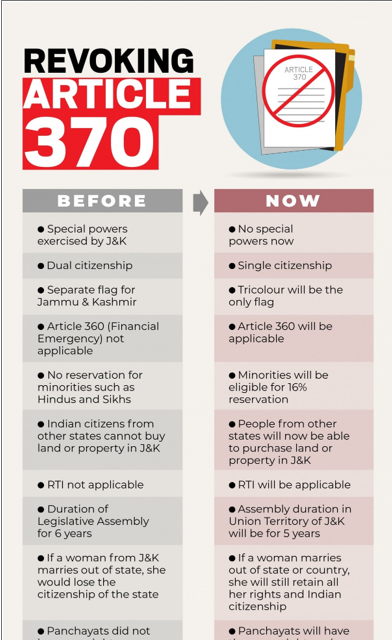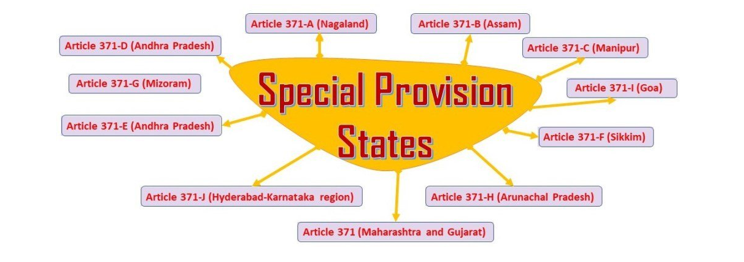Part XXI (Articles 369–392)
Part XXI (Articles 369–392) of the Indian Constitution: “Temporary, Transitional and Special Provisions”
Overview: Part XXI – Temporary, Transitional and Special Provisions
- Articles: 369 to 392
- Purpose: To make temporary, transitional, and special provisions to facilitate the implementation of the Constitution, especially during the time of transition from British rule to independent India.
- It includes temporary provisions for the Parliament, transitional arrangements, and special provisions for certain states (especially Jammu & Kashmir, Nagaland, etc.).
Key Articles Explained in Detail:
Article 369 – Temporary power to make laws with respect to certain matters in the State List
- For 5 years from the commencement of the Constitution (i.e., till 26 January 1955), Parliament had the power to make laws with respect to items in the State List (List II) like:
- Trade and commerce within a state
- Production, supply, and distribution of foodstuffs, cattle fodder, coal, iron, and cotton
Purpose: Address post-independence economic challenges temporarily until federal arrangements matured.
Articles 370 to 371J – Special Provisions for Certain States
These articles grant asymmetric federalism by providing special status or provisions for certain states due to historical, cultural, or political reasons.
Article 370 (Repealed) – Special status of Jammu and Kashmir
- Gave autonomous status to J&K.
- Central laws did not apply unless concurred by the state government.
- State had its own Constitution.
- Abrogated on 5 August 2019 by Presidential Order C.O. 272 and the Jammu and Kashmir Reorganisation Act, 2019.

Article 371 to 371J – Special Provisions for Various States
Article | State(s) | Key Features |
371 | Maharashtra, Gujarat | Special responsibility of Governor for development of backward areas. |
371A | Nagaland | Parliament needs state assembly approval to apply laws on religious or social practices, customary law, land ownership. |
371B | Assam | Provision for a committee of legislators from tribal areas. |
371C | Manipur | Similar provision for the hill areas of Manipur. |
371D & 371E | Andhra Pradesh (and Telangana) | Equitable opportunities in public employment and education; establishment of central university. |
371F | Sikkim | Special provisions after its accession to India in 1975; recognition of pre-existing laws and Assembly. |
371G | Mizoram | Parliament cannot make laws on religious/social customs without state assembly approval. |
371H | Arunachal Pradesh | Law and order vested in Governor; discretion in their judgment. |
371I | Goa | Small legislature of 30 MLAs. |
371J | Karnataka (Hyderabad-Karnataka region) | Special status for backward regions: educational & job reservation, special development board. |

Article 372 – Continuance of existing laws and their adaptation
- Laws in force before the commencement of the Constitution will continue unless they contradict the Constitution or are repealed.
- Allowed for smooth transition from colonial rule.
Article 372A – Power to adapt laws
- Added by the 7th Amendment (1956).
- Parliament empowered to modify laws in relation to the reorganisation of states.
Article 373 – Power of President to make orders in respect of persons under preventive detention
- Transitional provision to issue orders regarding preventive detention for up to 1 year from Constitution commencement.
Article 374 – Provisions as to the Judges of the Federal Court and proceedings pending
- Judges of the Federal Court (British India) to continue till replaced.
- Cases pending before Federal Court to be transferred to the Supreme Court.
Article 375 – Courts, authorities, and officers to continue to function
- Ensures continuity of administrative machinery.
- Pre-Constitution judicial and executive officers continue under the new regime.
Article 376 – Judges of High Courts to continue
- Allowed judges of existing high courts to continue unless replaced under the new framework.
Article 377 – Provisions as to the Comptroller and Auditor-General
- Transitional provision for appointment and continuity of the CAG of India.
Article 378 – Provisions as to Public Service Commissions
- Existing Public Service Commission’s (central and state) to continue with transitional modifications.
Article 378A – Special provision for the formation of Public Service Commission for UTs
- Added by the 7th Amendment.
- Created a provision for Public Service Commission for Union Territories.
Article 379 to 391 – Repealed Articles
These articles dealt with provisions related to the Constituent Assembly, Indian Independence Act, and transition from colonial rule. Most of these are now repealed or obsolete.
Article 392 – Power of the President to remove difficulties
- Transitional power to make orders for removing difficulties in implementing the Constitution.
- This power was valid only for 3 years (i.e., till 26 January 1953).
- Was a temporary enabling clause to smooth the constitutional shift.
JUDGMENTS & CASE LAWS:
Article 370 – (Special status of Jammu & Kashmir)
Landmark Judgments:
- Prem Nath Kaul v. State of J&K (1959)
- Held that Constituent Assembly of J&K had to decide the scope of Article 370.
- Once it dissolved (1957), the scope of Article 370 was considered frozen.
- Sampat Prakash v. State of J&K (1969)
- Upheld the continued use of Article 370 to apply constitutional provisions to J&K even after its Constituent Assembly dissolved.
- State Bank of India v. Santosh Gupta (2017)
- Reinforced that laws under Union List can be extended to J&K through Presidential Orders under Article 370.
- Supreme Court Constitution Bench (In Re Article 370) – Ongoing
- After abrogation on 5 August 2019, petitions challenged its validity and procedure.
- Judgment (Dec 2023): Supreme Court upheld the constitutional validity of abrogation and reorganisation of J&K into UTs.
Articles 371–371J – Special Provisions for Various States
Important Judgments:
- T. Venkata Reddy v. State of Andhra Pradesh (1985)
- Upheld reservations and local preferences under Article 371D for Andhra Pradesh as constitutionally valid.
- Rangaiah v. State of Andhra Pradesh (1983)
- Stated that local area reservations under 371D must adhere to constitutional safeguards.
- Suresh Kumar v. State of Karnataka (2013)
- Validated Article 371J (Hyderabad-Karnataka special status) as constitutional, not violating equality under Article 14.
Article 372 – Continuance of Existing Laws
Important Judgments:
Keshavan Madhava Menon v. State of Bombay (1951)
- Held that pre-Constitution laws continue unless inconsistent with fundamental rights.
- Established the principle of doctrine of eclipse.
Deep Chand v. State of Uttar Pradesh (1959)
- Reaffirmed that pre-constitutional laws remain valid unless repealed or amended to contradict the Constitution.
Article 392 – Power of the President to Remove Difficulties
Usage:
- Invoked several times between 1949 and 1953 to resolve transitional administrative issues.
- Example: Adaptation of laws and executive orders under President’s authority.
IMPORTANT AMENDMENTS RELATED TO PART XXI
Amendment | Year | Article(s) Affected | Description |
7th Amendment | 1956 | 372A, 378A added | Laws adaptation post state reorganisation; UT PSC creation |
13th Amendment | 1962 | Article 371A | Special provisions for Nagaland |
22nd Amendment | 1969 | Article 371B & 371C | Special provisions for Assam and Manipur |
36th Amendment | 1975 | Article 371F | Accession of Sikkim into India |
53rd Amendment | 1986 | Article 371G | Special provisions for Mizoram |
55th Amendment | 1987 | Article 371H | Special powers to Governor of Arunachal Pradesh |
56th Amendment | 1987 | Article 371I | Provision for Goa |
57th Amendment | 1987 | Extension of SC/ST reservation in Nagaland, Meghalaya, Mizoram, Arunachal Pradesh | |
73rd & 74th Amendments | 1992 | Applied with modifications in Sixth Schedule areas (tribal regions) | |
98th Amendment | 2012 | Article 371J | Hyderabad-Karnataka region given special status |
Summary Table
Category | Relevant Articles | Purpose |
Temporary legislative powers | 369 | Allowed Parliament to legislate on State subjects |
Special provisions for states | 370–371J | Asymmetric federalism for unique state conditions |
Transitional provisions | 372–378A | Continuity of laws, offices, and institutions |
Repealed/obsolete provisions | 379–391 | Related to Constituent Assembly & colonial transition |
Difficulty removal | 392 | Temporary power to resolve constitutional transition issues |
